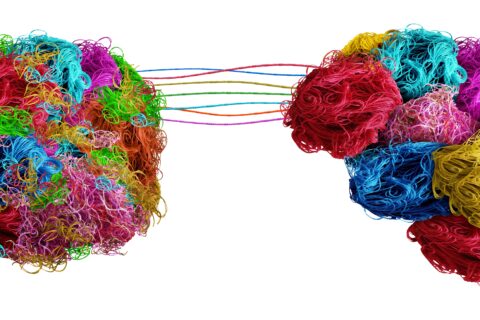Coach Grant Holicky details the concept of mindfulness, how to attain it, and how it can help performance.
Video Transcript
Chris Case 00:00
Welcome back to Fast Talk Labs Grant Holicky Yep, thanks for having me. Today we’re talking about the mindful athlete. What does that mean? What happens when you can’t remain mindful? But how? Also, how can you be mindful? That’s what we want to talk about, right?
Grant Holicky 00:15
Yeah. And I think for most athletes, some of the things that gets them in trouble is they’re not in the present moment. They’re having trouble being right here right now, really concentrating on what’s going on. They’re thinking about what may happen down the road, they’re thinking about what happened 10 minutes ago. So coming up with methods to keep us in the moment, and then coming up with with things that insulate us from that problem down the road, what can we be doing on a daily basis that protects us from losing that in the moment that mindfulness and that ability to be present as an athlete?
Chris Case 00:48
Alright, let’s explore.
Chris Case 00:59
Welcome to Fast Talk Laboratories, your source for the science of endurance performance.
Chris Case 01:09
I think to help us understand more about this mindfulness concept. Tell us what happens when someone starts to lose that ability to be present.
Grant Holicky 01:19
Yeah, so we see it a lot in athletics, and we call it choking. And that’s the common vernacular, but it’s actually a technical term in sports psychology, too. And, and what starts to happen is things that are rote things that we know how to do without thinking, we actually start to think about them. And this is something that they’ve observed in athletes with the yips are athletes that the old Chuck Knobloch not being able to throw it a first base, they start trying to think through the motion of throwing the first base, and that doesn’t really work anymore. A great example of that is, I remember a couple years back, I was leading a cyclocross race. And that doesn’t happen to me very often. I was very excited. I was like, I’m winning. All I got to do is not screw this up. And immediately I started thinking about all that corner coming up. Yep. And bailed in biffed, it just was a train wreck. Luckily, I got up and was able to keep going. And I was in a place in that moment where I started laughing at myself. And that brought me back to Hey, just enjoy where you’re at. And then I rode really well from the end. So what we need to do is understand that we want to be on that autopilot, right? We want to trust what we’ve done in our training, trust what we’ve done in our practice, and just let that come out. In a race. There’s an incredibly popular TV show right now. But the TED lasso quote of be a goldfish, because a goldfish has the shortest memory of any animal on the planet. That’s what you want. As an athlete. You can’t do anything about what’s happened in the past, you really can’t do anything about what might happen in the future. But prepare. So that is our moment, right here right now, the past is irrelevant. The only thing that matters is what’s going forward.
Chris Case 03:03
Okay, so how do we insulate ourselves from that situation,
Grant Holicky 03:07
there’s a couple things that you can do to remind yourself of what you’re doing. I mean, I’ve been around a lot of sports teams, swim teams that will put it on a T shirt right here, right now. You’ll see it with football teams, that’s a typical chant. One of them will yell, where are we in the responses right here right now. So those things in the moment to remind yourself, this is what I’m doing. This is why I’m doing it. And even talking yourself through I can’t do anything about what already happened. And the only thing I can do to help me about what might happen in the future is to prepare. And I think so many athletes get caught up in that concern about what might happen, what might happen, what might happen, they find themselves not preparing in the moment, they’re so worried about that race that’s coming up, that maybe they’re not eating the way they need to eat before the race, they’re so worried about when that break might go in the race, they’re not in the right position to be able to respond to that break. So giving yourself maybe a mantra that just reminds you to come back to the present moment. There’s a Taoist response of how to look at the world. And what they say is that you are equivalent to a boat going down the river, what has already happened in the river, you can’t go upstream and fix it. And what might be coming in the river. Well, you can’t change where that rock is, all you can do is position your boat to best deal with it. So that approach is is the correct approach. And that’s what we want to be thinking of. That being said, there are some tools that we can use on a daily basis that helped remind us of where we are.
Chris Case 04:43
Yeah, I think you know, something to jump in here. Sorry. This doesn’t happen overnight. This takes practice, right? This is a skill,
Grant Holicky 04:51
right? Absolutely and we talked about a lot with the kids I coach, as a great example and this is very true with Masters athletes too. You tend run from one thing to another very quickly, and those things tend to kind of come together. So you’re finishing work and trying to start a ride, there’s no break. So you’re bringing all of those things that might have happened at work to the ride, or you’re bringing what might have happened in your ride to your family at home at night, right? So one of the things that I really suggest is building in these breaks, and it can just be three minutes, two minutes, where you sit and be still for just the moment and remind yourself of, I’m just gonna put away what already happened. And even if I’m phenomenal things are fantastic. I’m gonna put that away for just a moment. Now I’m going to walk into training, or now I’m going to walk into racing with a clear head and a clear approach. So that’s one thing we can do building in those breaks those mental breaks. And that that you’d like you said, that takes a lot of time. That’s hard to do.
Chris Case 05:51
Yeah, compartmentalization is way easier said than done.
Grant Holicky 05:57
Absolutely. So one of the other things that I suggest is meditation. And this sounds for a lot of people, they have a hard time with it, because it sounds kind of out there and all those things. But I don’t think meditation needs to be what we think it needs to be right? Most people’s responses. When I say meditation, they say, I can’t clear my head, I can’t do that. But what I find is, I use the bike as my meditation, I don’t put in music, I’ll roll out on the bike. And I’ll spend that first 10 minutes of the ride first 15 minutes of the ride, listening to the wind, and thinking about my pedaling. That is a mind clearing mechanism. And if you want to take that to the next level, really sitting in being still and thinking just about your breath, that’s next level. And it really does make a big difference of clearing your head.
Chris Case 06:48
Yeah, I think to go back to your point about using the bike as meditation. Walking through a process where you’re thinking about the wind, the other sensations, your breathing, your pedal stroke, the muscles, all those feelings, that really takes away your ability to sense. So you don’t want to lose track of traffic and writings that will hinder your safety. But it it brings the focus on to you what’s going on here. And that makes you present.
Grant Holicky 07:24
Right, and that’s exactly what it is that we’re trying to do. One of the things that we’ve mentioned it in the focus episode, we’re not necessarily trying to clear out our mind of all those other things, we’re trying to place the most important things into our mind clearly. And that in and of itself will force those other things out. So just listening to the tire on the road listening to, you know, maybe your gearing is slightly off, and there’s that little click of the chain on the front derailleur. That’s a fantastic thing to just dial into, because it’ll push everything else out. And and for safety first. But for this idea of mindfulness second, I’m a huge believer in writing without music, and without noise, just to start to bring those things in. And what you’ll start to feel is those thoughts of the day come back to you in these clear moments that with are better presented without judgment, and then you can process them, you can look at it and go, that’s fantastic. And put it away.
Chris Case 08:21
Yeah, a lot of people that are not into cycling as much as you and I they don’t ride that much. They’ll say what do you think about on a 2-3-4 hour ride? And my answer is half jokingly, I think about nothing and everything simultaneously, you’re absorbing, you’re letting your mind just sort of wander, find its place, relax a little bit. Push some stuff away. Focus on what’s more important at the time. There’s a lot going on, it doesn’t seem like it at the time. And again, this takes practice to. You can’t expect this to happen on your first ride.
Grant Holicky 08:56
No, and I think it also happens. I think one of the things the ways you get there is really truly learning to ride easy. And learning to ride slow, letting all that come in. When you’re doing intervals in your riding hard about all that’s going through your head is just ahhh,
Chris Case 09:10
yeah, make it stop.
Grant Holicky 09:13
right, coming back to those things that look at the mountains, look at the trees, look at the water in the ditch on the side of the road, just enjoy being out on that bike. And it sounds a little touchy feely, but there really is a lot to it. This is the reason we ride. This is why we get out on the bike, to be one with ourselves and to be one with everything else. And I think it’s so easy for us to lose touch of all of those things. Really being a mindful athlete is coming back to that and really drawing everything full circle and going Why am I here? Why do I do this? I’m gonna let all that in, and that’ll push everything else out.
Chris Case 09:51
One last question. Maybe a tough question. How does being a mindful athlete make you a better performing athlete?
Grant Holicky 09:59
Well, I think what it Does it takes away anxiety, if all you’re really worried about is what you can do in the present, that’s where your energy goes, we’re not worried about results. We’re not worried about what might happen. We’re not worried about what could happen. We’re focused on what we’re doing right now. And the task at hand and the many times that you’ll hear a parent, a teacher, a coach, have yelled at us in the past, focus on what’s going on or just yelling focus. That can be so, so hard, and it’s not really productive to yell, focus, I’ve yelled at my son, hey, focus on putting your socks on, we got to get to school. But that doesn’t necessarily help. But what can help is teaching people to just dial in on what they’re doing in that moment, you’re going to be more efficient, you’re going to have a heck of a lot more fun. And the results, they’re probably going to come in and of themselves.
Chris Case 10:51
Excellent. Well, thank you again, Grant Holicky,
Grant Holicky 10:54
it’s always my pleasure to be here.
Chris Case 10:55
Always great talking to you about sports psychology in general and being a mindful athlete specifically today. Thanks again for joining us here at Fast Talk Labs.
Grant Holicky 11:03
And remember, if you have any questions, please join the forum and ask them directly to me. I’d be really excited to engage in conversations about this stuff.



